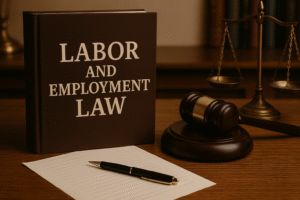Labor and Employment Law: Your Complete Guide to Workplace Rights and Responsibilities
Understanding Labor and Employment Law in the Modern Workplace
Overview
Both companies and employees must comprehend labor and employment law in the dynamic and quickly changing workplace of today. The interactions between employees, employers, trade unions, and the government are governed by these legal frameworks. The breadth and complexity of labor and employment law have greatly increased with the growth of remote work, gig economy jobs, and workplace diversity.
This extensive blog explores the foundations, contemporary developments, and crucial facets of labor and employment law, assisting readers in navigating its complexities and comprehending their rights and obligations at work.
Labor and Employment Law: What Is It?
There are two related but separate topics of labor and employment law:
-
Labor law: The rights of workers to organize, create unions, and participate in collective bargaining are the main topics of labor law. It contains laws against unfair labor practices, picketing, and strikes.
-
Employment law: Individual employment relationships are governed by employment law, which addresses matters including pay, working conditions, safety in the workplace, harassment, discrimination, and wrongful termination.
By offering safeguards and encouraging equitable treatment at work, labor and employment laws work together to maintain a balance of power between employers and employees.
Important Elements of Employment and Labor Law
Laws Concerning Wages and Hours
-
Regulate labor hours, meal breaks, overtime compensation, and the minimum wage.
-
One of the most important federal laws in the United States is the Fair Labor Standards Act (FLSA).
Laws Prohibiting Discrimination
-
Stop discrimination at work on the basis of sexual orientation, gender, age, race, religion, or handicap.
-
The Equal Employment Opportunity Commission (EEOC) enforces it.
Regulations for Workplace Safety
-
Mandated by the Occupational Safety and Health Administration (OSHA).
-
It is the responsibility of employers to keep their workplaces safe and free from hazards.
Medical and Family Leave
-
Eligible employees may take unpaid leave for family or medical reasons without losing their jobs under the Family and Medical Leave Act (FMLA).
Unjust Termination
-
Occurs when a worker is let go for unlawful reasons, like discrimination, retribution, or breaking employment agreements.
Collective Bargaining and Union Rights
-
Employees are entitled to organize unions and engage in collective bargaining for improved pay and working conditions.
-
Governed by the National Labor Relations Act (NLRA).
Current Developments in Employment and Labor Law
Hybrid Models and Remote Work
-
New legal issues pertaining to privacy rights, time tracking, and compensation for home office costs.
-
To comply with the most recent labor and employment legislation requirements, businesses must update their policies.
The Gig Economy and Self-Employed People
-
Disputes in court over whether workers should be classified as independent contractors or employees.
-
Crucial for figuring out who is eligible for protections and benefits.
Diversity and Inclusion in the Workplace
-
A focus on establishing fair workplaces devoid of discrimination and harassment.
-
Employers putting inclusive policies and training initiatives into action.
Mental Health and the Welfare of Employees
-
Growing understanding of the role that mental health plays in workplace productivity and safety.
-
Employers are addressing mental health by offering help and benefits.
Pay Equity and Transparency
-
Laws that guarantee equal compensation for equal effort and require the publication of salary ranges.
-
Fights pay disparities and advances justice.
The Obligations of Employers Under Labor and Employment Law
Employers need to:
-
Observe wage and hour regulations.
-
Ensure that there is no prejudice at work.
-
Establish a secure workplace.
-
Respect workers’ rights to bargain and form a union.
-
Document policies clearly in employee handbooks.
Infractions of labor and employment rules may result in legal action, penalties, and harm to one’s reputation.
Labor and Employment Law’s Protection of Employee Rights
Workers have the following rights:
-
Fair pay and overtime benefits.
-
Freedom from harassment and prejudice.
-
Take time off for family and medical needs.
-
A secure work environment.
-
Defense against unjust firing.
Employees who are aware of their rights are more equipped to stand up for themselves and, if needed, pursue legal action.
Typical Legal Conflicts in Employment and Labor Law
-
Allegations of Discrimination: According to age, gender, color, religion, or handicap.
-
Hour and Wage Conflicts: Involving violations of the minimum wage or underpaid overtime.
-
Unjust Termination: Allegations of retribution or dismissal without cause.
-
Cases of Harassment: Such as hostile work settings or sexual harassment.
-
Retaliation: Actions taken against workers who failed to report infractions.
How to Continue Adhering to Employment and Labor Laws
-
Frequent Training: Make sure management and HR are knowledgeable on the most recent legal needs.
-
Clearly Defined Policies: Create thorough staff manuals.
-
Legal Consultation: Seek advice from labor lawyers.
-
Internal Audits: Examine business procedures on a regular basis.
-
Promote Reporting: Establish secure avenues for staff members to express their concerns.
In Conclusion
Millions of workers’ lives and the operations of many enterprises are directly impacted by labor and employment law, a crucial field of legal regulation. Being aware of these regulations not only guarantees adherence but also fosters a more wholesome and just work environment. In today’s workplace, having a solid grasp of labor and employment law is essential, whether you’re an employee defending your rights or an employer trying to fulfill your legal obligations.
For more information, legal updates, and professional advice on labor and employment law to help you remain ahead in the always changing workplace, keep checking out our blog.


Post Comment